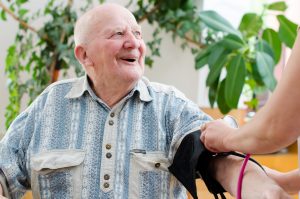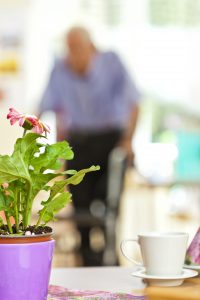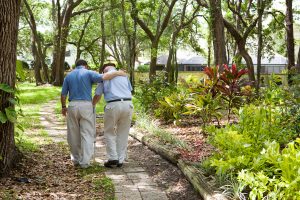When Dad came home from hospital, after the 3rd stroke and we made the decision to adopt a palliative approach to Dad’s care in the forthcoming weeks, we were presented with a situation we didn’t anticipate.
Withdrawing Dad’s medications didn’t result in the big stroke that we had expected.
When my GP came to see Dad, for a review at home, he checked Dad’s heart rate and blood pressure and informed us that both were fine.
Fine?
My Dad had a heart arrhythmia. 
Atrial Fibrillation.
His heart rate was never fine!
And without his antihypertensive medications, his blood pressure should have been elevated.
But it wasn’t.
What was going on?
Dad’s vital signs being fine didn’t cause us to alter the way we were approaching Dad’s care though.
We didn’t second guess our decision to reduce Dad’s medications.
We were entirely comfortable that whatever was going to be, was going to be.
A so we just made the best of every day.
As long as Dad was comfortable and happy…as happy as we could make him, then we were ok with that.
The path deviated. 
Over the coming weeks, which became months, Dad gradually became physically stronger.
He was still very frail, but he was able to get out of his chair and out of his bed with minimal assistance.
When he left hospital in early August 2017 he was a 2 person transfer.
My sister and I were able to spend the nights at our own homes, rather than sleep at my parent’s place because Mum was able to manage Dad’s transfers herself.
But with this somewhat improved function, improved mobility, Dad became quite active.
We were used to Dad just sitting in his chair and depending on us to help him into his wheelchair, help him into the car for a drive or wheel him around the garden or wherever he wanted to go.
But with this renewed strength, he became independently mobile.
And THIS was a challenge!
Dad would just launch himself out of his chair, unannounced and take off at break neck speed… tottering out the door and into the garden or down the hallway and out into the garage.
And the speed with which he did this seemed impossible.
Mum would turn her back for a few minutes and he would be up and gone…then she would find him out in the garden or out in the garage trying to get into the car.
The challenge then was convincing him to return inside!
He never fell though.
Not once.
But it meant that the rest of us were always in a state of hypervigilance and concern for his well being.
The last thing we wanted was for Dad to fall and sustain a broken hip and for us to be faced with the decision to send him to hospital or not.
We had after all, adopted a palliative approach to Dad’s care and any hospital admission in this type of situation would have meant Dad’s last days would have been spent in hospital.
This was something we all felt strongly against.
What did we do?
We thanked the universe for keeping him safe and we accepted that he was doing what he needed to do, that he was trying to retain his identity and purpose in the midst of this bleak and confusing situation that is Alzheimer’s disease.
Leave a Reply